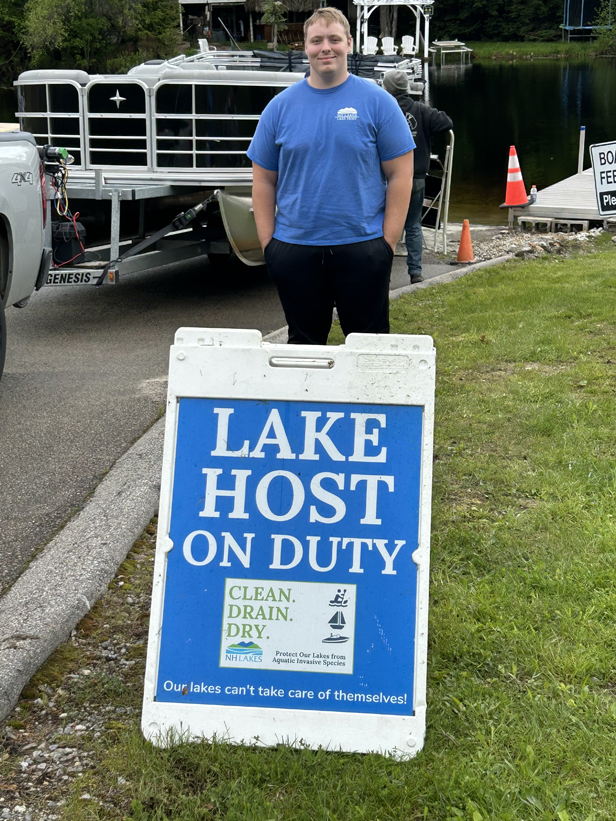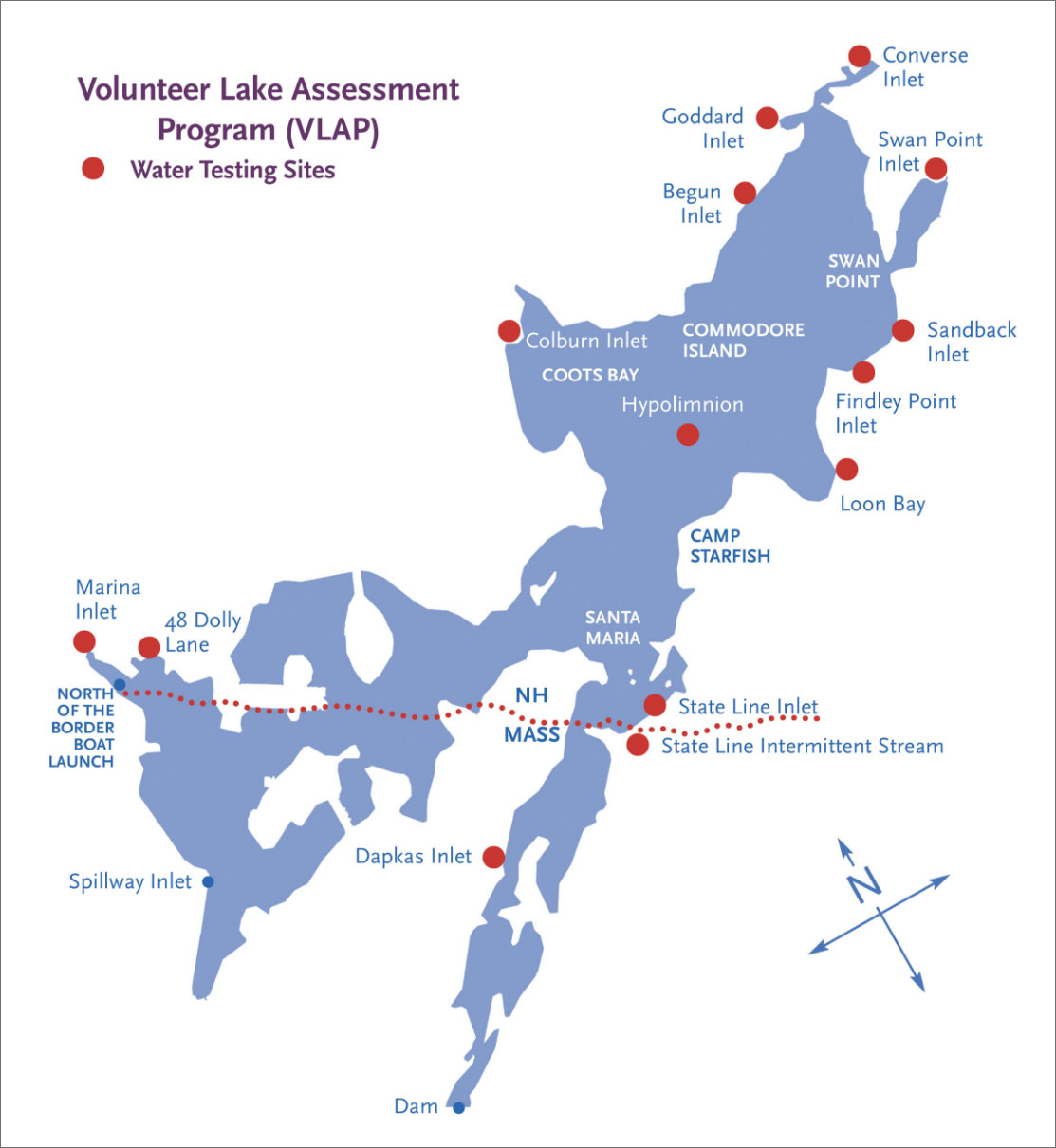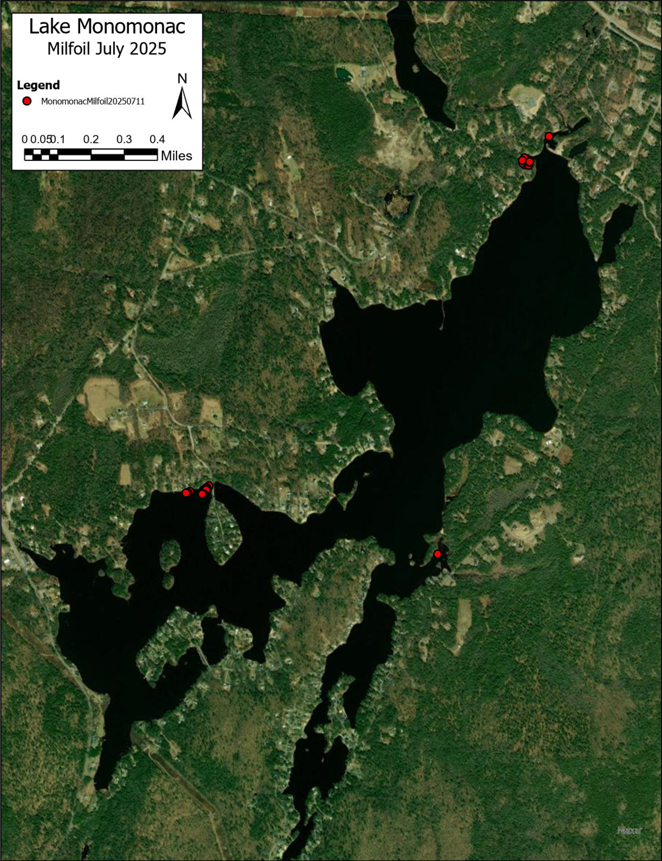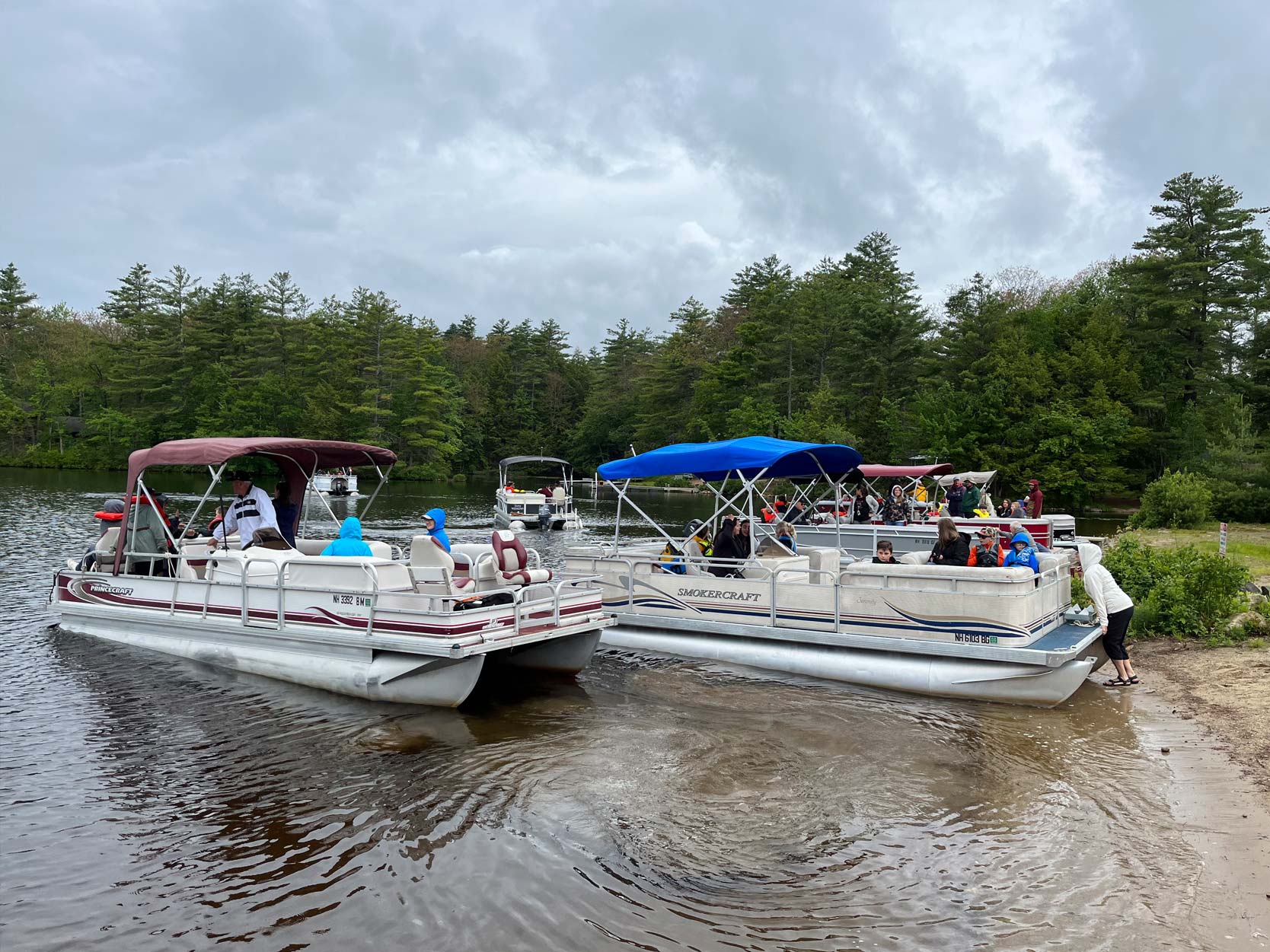Our Work
Watershed Management Plan
In early September, the specific project plan was approved by both New Hampshire DES and the EPA. Since that approval, FB Environmental has completed several key deliverables, including a municipal ordinance review, a Lake Water Quality Report, and a Shoreline Survey. In addition, a Septic Survey is currently underway and is expected to be completed in January. We extend our thanks to the 140 lakefront property owners who participated in that survey.
Water Quality Findings
The Lake Water Quality Report determined that internal phosphorus loading is occurring in our lake. Phosphorus can enter the lake from external sources—such as fertilizer use, bird droppings, and failing septic systems—or from internal sources. Internal loading occurs when oxygen levels at the lake bottom drop during the summer, causing phosphorus stored in sediments to be released into the water column. For mesotrophic lakes like ours, DES standards for phosphorus are set at 12 parts per billion (ppb). Our measurements are 12.2 ppb and trending upward. Even small amounts above the standard level in phosphorus can significantly worsen cyanobacteria blooms—an issue we are already facing. We are also over the line for chlorophyll-a at 4.9 ppb. DES standards call for a maximum of 4.8 ppb.
In addition, the report indicates that our lake’s pH level is 6.4. The ideal pH range is between 6.5 and 8.0., so we are slightly below the recommended range. Acidic inflow was identified at four lake inlets.
Shoreline Survey Results
The Shoreline Survey assessed all 440 properties around the lake using five criteria:
- Presence of a vegetative buffer
- Bare soil (including sandy beaches)
- Evidence of erosion
- Distance from the shoreline
- Slope of the property
Using these data, FB Environmental calculated both shoreline disturbance and shoreline vulnerability scores. The results are concerning:
- 51% of surveyed properties showed an abnormally high shoreline disturbance score
- 79% showed an abnormally high shoreline vulnerability score
These conditions represent a significant source of phosphorus entering the lake—and this assessment does not yet include results from the septic survey.
What This Means—and What We Can Do
As we move forward, we want to reassure everyone that this is just the beginning of our efforts. Once the final Watershed Management Plan report is issued in fall 2026, we’ll turn our full attention to implementing solutions. That means we’ll start mapping out concrete steps to mitigate the issues we’ve identified, working together as a community to protect and improve our lake’s health.
The studies completed to date make one thing clear: there is no single solution or “switch to flip” that will reverse these trends. Protecting and improving lake water quality will require collective, incremental action. We will help property owners identify opportunities to reduce stormwater runoff and erosion on their property. Many of these improvements are relatively simple and can be done as DIY projects if you so choose.
One initiative we will move forward with in the spring, even before the final Watershed Management Plan report is issued, is partnering with NH LAKES to work toward becoming a LakeSmart Community. More information will be shared soon on how everyone can participate and contribute to this important effort. In the interim, we suggest you take a look at the NH LAKES LakeSmart Book, a valuable guide that outlines practical steps homeowners can take to improve shoreline conditions and protect water quality.
Stay tuned for more details as we roll out next steps in our efforts to protect and improve the long-term health of our lake.
Lake Host Program
The Lake Host Program was created by the NH Legislature in 2000 to minimize the introduction and spread of invasive aquatic plants and animals in NH lakes.
Lake hosts are present at boat ramps to perform courtesy inspections on boats and trailers entering and leaving the lake. These inspections are intended to detect invasive species before they can be transferred into a water body; once established, invasive aquatic animals and plants can quickly and profoundly change the character of a lake and can be difficult and costly to remediate. Financial support for the program comes from various places: MLPOA, WSLA, individuals and state grants managed by NH Lakes.


Water Testing—Volunteer Lake Assessment Program (VLAP)
The New Hampshire VLAP is one of the oldest programs in the state for the protection and preservation of lakes. It was launched in 1985 to establish a citizen-based lake sampling program to assist NHDES in evaluating lake quality throughout the state and to empower citizens with information about the health of the state’s lakes and ponds. This cooperative effort allows state biologists and lake associations to make educated decisions regarding the condition of their lakes.
MLPOA volunteers collect water samples at various locations around the lake each June, July, and August. These sample are sent to NHDES, which analyzes and interprets the data and provides an annual water quality report specific to our lake.


Cyanobacteria
Questions and answers about Cyanobacteria (Click to view PDF.)
Cyanobacteria (formerly known as blue-green algae) are naturally occurring in most lakes, though often in relatively low concentrations. Many species of cyanobacteria grow in colonies that form surface-water “blooms.” Blooms consist of thousands of individual cells and are diverse in appearance, ranging from green, blue-green, yellow, white or black. Research indicates that cyanobacteria concentrations increase as lake nutrients increase.
In 2024, Lake Monomonac, as well as many other nearby lakes, experienced an increase in reported blooms. This increase may be attributed to the use of fertilizers containing phosphorus. Frequent blooms not only represent a health hazard, they impair recreational use of the lake and depress property values.
Potential blooms can be reported through the NHDES Website Bloom Report Form or by scanning the QR code below. NHDES will sample the site to determine if cyanobacteria are present. If concentrations are elevated, it will issue a lake warning (advisory), continue to monitor the affected area until the bloom has cleared and update the appropriate parties. It is advised that if you or your pet comes in contact with cyanobacteria, you rinse off with fresh water as soon as possible.



Invasive Eurasian Water Milfoil
MLPOA works with NHDES to control the invasive Eurasian water milfoil on the lake. Each spring and early fall (if time allows) NHDES surveys our lake and maps where they find milfoil. At present we control the milfoil on the lake with the use of divers harvesting the milfoil. We contract with divers recommended by NHDES. We have a grant agreement with NHDES for costs. (In 2025 it was a 50% grant.) We have treated specific areas of the lake chemically in the past and are now using divers to manually remove the smaller less dense plants that exist today. Today, only smaller/less dense areas exist.
The red dots on the 2025 lake map (right) identify milfoil areas which were removed by divers. We are pleased we can once again make the NH side of the lake milfoil-free. See the full report (PDF).

John Sarasin Lake Education Day
Established in 1969, this joint effort with NHDES was initially titled Lake Ecology Day. In 2005, it was renamed in honor of its founder, John Sarasin. John wanted to impress upon young people the importance of vigilance in protecting lake health. Each spring, fifth grade students from Rindge and Winchendon join NHDES limnologists on pontoon boats supplied and captained by MLPOA members for a day of hands-on water tests that are designed to reflect the health of the lake. NH DES tells us that we are the only lake in NH holding a Lake Education Day!
Lake Education Day a Big Success!
On Thurs June 5, 2025 we had 10 NH DES limnologists, 42 fifth grade students from Rindge Elementary, teachers, and chaperones in 9 boats out on the lake water testing and learning about NH water quality. The kids were very inquisitive—we’re hoping to build future environmentalists! Lake Education Day furthers the MLPOA mission of educating the public about lake stewardship. Thanks to all for helping to make it a wonderful experience for the students by sharing or captaining a boat; RABA (Rindge Acres Beach Association) for the use of their beach in launching the boats; and of course to Laureen Moran, Lake Day Ed Coordinator and Secretary of MLPOA.


